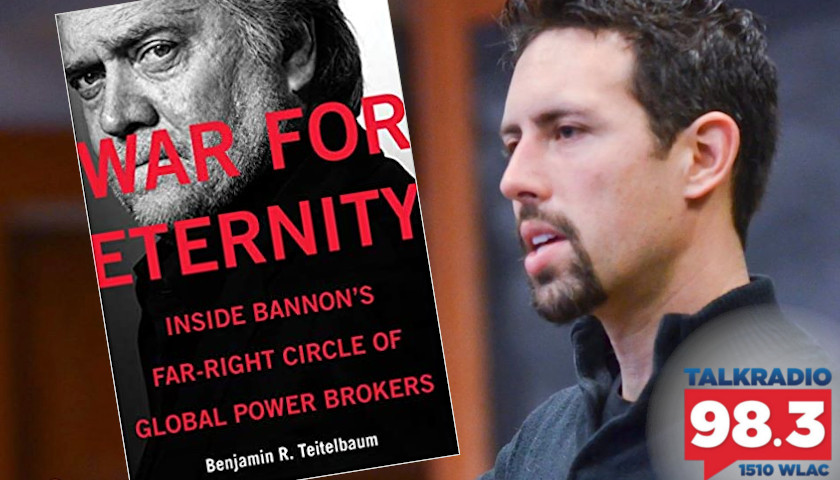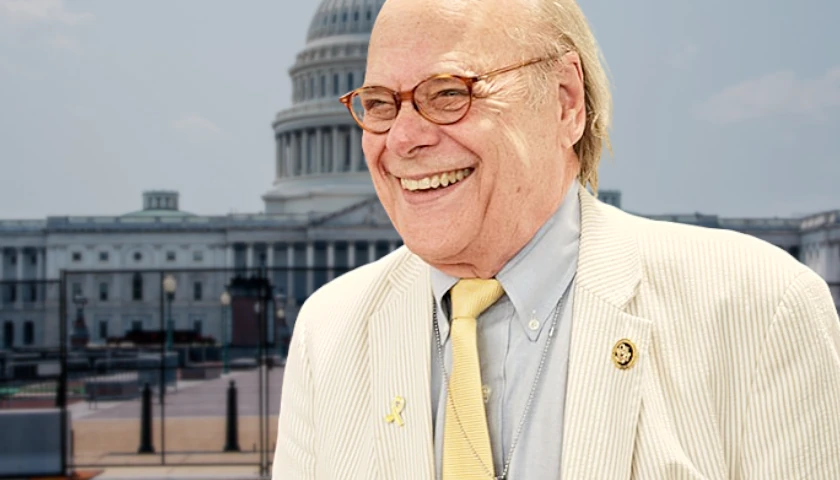In a special interview on Wednesday’s Tennessee Star Report with Michael Patrick Leahy – broadcast on Nashville’s Talk Radio 98.3 and 1510 WLAC weekdays from 5:00 a.m. to 8:00 a.m. Leahy interviewed Ben Teitelman who wrote the book called “War for Eternity: Inside Bannon’s Far-Right Circle of Global Power Brokers.”
During the third hour, Teitelman discussed what inspired him to write his book and how he came to meet Steve Bannon. He added that he found something unique in Bannon that was tapping into the “spiritual significance of the working class.”
Leahy: Our guest, Benjamin Teitelbaum a professor of music and ethnography from the University of Colorado got his start playing the Nickel Harpa.
Teitelbaum: A pleasure to be with you. That is correct.
Leahy: You are the author of a book called “War for Eternity: Inside Bannon’s Far-Right Circle of Global Power Brokers.” And just for the record, Steve Bannon is a good friend of mine. He hired me at Breitbart in 2012.
Teitelbaum: Wow.
Leahy: And we’ve been good friends ever since. He was very interested in making sure we interviewed you. So welcome here to The Tennessee Star. How did you, somebody that’s an expert in the Nickel Harpa? Not the one in West Virginia.
Teitelbaum: That is correct.
Leahy: You got a Ph.D. at Brown. You’re now a professor at the University of Colorado and you specialize in ethnology and music. How did you become interested in talking to Steve Bannon?
Teitelbaum: It’s quite a story and again it’s a pleasure to be with you, Michael. So, I actually as time went on political actors’ interest in music. But when you do that for a decade or so as I have you end up studying lots of ideas as well. You end up studying politics. Sometimes music loosens people up and they will talk to you about other things than if you said you were a political scientist.
Long story short, over that period of time, I ended up learning about a particular type of ideology that was exceedingly rare and was just completely blown away when in 2016-17 we heard that Steve Bannon knew about this ideology. Very very rare stuff. Just a few New York Times reports. And when I heard about it, afterward it took me about a year to get on his radar.
Leahy: I can imagine what that was like Ben. (Laughter) By the way, let me compliment this part of your book. I’ve worked with Steve for over a decade now and very good friends. I think you captured the essence of him. I was laughing out loud when you described a typical phone conversation with Steve. No salutations right?
Teitelbaum: Yes. (Laughs) I’ve never seen anything like except in a movie where someone will call you with no hello. When the business is done the call ends.
Leahy: I have thousands and thousands of emails back and forth and hundreds of phone conversations. I’ve never had a phone conversation with Steve Bannon that’s lasted more than 60 seconds.
Teitelbaum: I don’t doubt it.
Leahy: You did a great job, by the way, capturing his personality. I want to say that.
Teitelbaum: It’s a wonderful endorsement. when you write a book like this it’s so easy especially with someone like Steve to fall into stereotypes about somebody. I’ve tried to write it to show who he is. And I was going to say he’s very short on the phone but if you get to him and you sit down with him, with three hours plus. And that’s very rare for someone too. If you are in front of them he’ll give you his time.
Leahy: Very well read guy too. Tell us obscure philosophy. It’s got a description that will be a little misleading. But tell us a little bit
Teitelbaum: It’s called traditionalism and that sounds like nothing essentially. Traditionalists think things were better before. And that’s kind of true in this case but is much much more elaborate. It’s a very unusual way of looking at history time cycles.
And that for the most part almost always as every day that goes by things are getting a little bit worse. And the only way things are going to get better is when things really really get bad. If you can follow me through all of that.
Leahy: Let me read from your book which is interesting. Page 76 of your book. I marked this down, Bannon’s modifications of the traditionalist standard often derived from his attempts to avoid the school’s most politically dangerous and damning dogmas.
Notably, it theorized the subordination of non-whites and the poor. And also execute a daring fusion with populism and American nationalism. I thought that fusionism idea, which is an idea from the American Conservative movement in the 1950s, I thought it was very insightful for you to use that term.
Teitelbaum: He’s doing something that really we haven’t seen anywhere in world history. And I’ve been consulting widely with my colleagues in the university world about this. He sees a certain what should see, a certain spiritual significance with the American working class.
Particularly the rural working class, not be as cosmopolitan and globalist as you would expect. And in his case, he believes that if you prioritize the interests of the American working class a lot of things will happen that typically politicians aren’t interested in talking about.
Not only might the paycheck be bigger in his mind but these people might go on a spiritual journey. And again that’s not the certain thing you’d expect a politician to talk about. Politicians don’t talk about collective spirituality or collective culture that often.
Leahy: Why do you think Steve agreed. When you finally got to Steve, why do you think he agreed to an interview with a professor who teaches in the music department of a more left-leaning institution. The University of Colorado-Boulder. Why do you think he agreed to these extensive series of interviews with you?
Teitelbaum: Well it started slow. To be honest Michael, I think I got it because I worked it for a year and just showed up at his doorstep and kind of made myself a nuisance.
Leahy: Was this at the Breitbart Embassy in Washington, D.C.?
Teitelbaum: This was in New York. I’ve been to the embassy a number of times yes.
Leahy: That’s an experience, isn’t it?
Teitelbaum: It is. It is for sure. But I think that long term he saw that I was genuinely curious and that I had expertise in this particular theory of traditionalism. And it goes a long way. I think you can tell, you’re an interviewer.
If you are genuinely interested in somebody or do anything funny people respond to that. And you stick with them. You stay on it. You stay upfront. And you give insights into how you’re thinking and people open up to you. You just got to stick to it.
Leahy: What do you think Steve Bannon in your view is trying to accomplish?
Teitelbaum: Right now he’s trying to accomplish a reformulation of American nationalism on the one hand. But also of geopolitics. It is a very very different vision for the world that he’s pushing right now and is now primarily aimed at isolating China. And this is going on and if you follow the news we’re hot off a weekend when the Chinese Communist Party attacked them in their state-run media.
Leahy: They attacked Steve Bannon?
Teitelbaum: Yes.
Leahy: What did they say? That’s news to me. Tell us what they said.
Teitelbaum: I’m shocked that it hasn’t been reported more. In one of their newscasts, they had an editorial segment where they said that Steve Bannon is propagating against China. We need to pay the world for this virus.
Steve Bannon is a right-wing extremist. He is an agent of chaos and needs to be disregarded and blah blah blah. Very very strange because they usually do not comment in those ways in this forum. Especially somebody who’snot even in government right now.
Leahy: Why do you feel they felt the need to undermine Steve Bannon. Why is the Chinese Communist Party attacking Steve Bannon?
Teitelbaum: I think there are two possible reasons. One is that there has been increased attention to the fact that Steve has been pushing diplomatically against the communist party and getting reception with fairly high scaled actors. I’m going to be shameless and say I might have something to do with that attention.
Leahy: Will you come back to this program next week perhaps and how well your book is being received generally.
Teitelbaum: It would be an honor yes.
Leahy: “War for Eternity: Inside Bannon’s Far-Right Circle of Global Power Brokers”
Listen to the full third hour:
– – –
Tune in weekdays from 5:00 – 8:00 a.m. to the Tennessee Star Report with Michael Patrick Leahy on Talk Radio 98.3 FM WLAC 1510. Listen online at iHeart Radio.
Photo “Ben Teitelbaum” by The University of Colorado. Photo “War for Eternity: Inside Bannon’s Far-Right Circle of Global Power Brokers” by Amazon.





